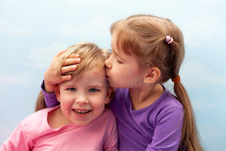 Kindness and the Mental Health Connection
Kindness and the Mental Health ConnectionThe earliest signs of kindness, which you can see pretty soon after birth, are the glimmerings of empathy and compassion - pain at the pain of others. Once they’re capable of coordinated movement, babies will often try to soothe others who are suffering, by patting and stroking.
Psychologically, acts of kindness make us feel grateful, empathetic, and compassionate. These are feelings that have a positive effect on mental health.
The Case for Kindness
Kindness means actions that are selfless or a mindset that puts others’ well-being before our own. “Kind actions can boost our mental and spiritual happiness,” says Karina Arias, a licensed clinical social worker at UK's PIH Health’s Psychiatry and Behavioral Health Clinic. “If you help a friend through a tough time or help a stranger solve a problem, you will feel a sense of purpose and will be aware of your own good fortune in relation to others.” "As a result, kindness makes us feel like we belong to a community. Knowing we are connected with those with whom we live and work wards off feelings of loneliness that can bring down our mood."
While being kind benefits us socially, there are also biological reasons why kindness improves our mental health. Our brains reward us when we do kind things. If you comfort someone who has lost a loved one, your brain helps us bond with others. We become more trusting, generous, and friendly. Additionally, kind actions signal our brains involvement in creating a beneficial feeling and lessening pain, depression, and anxiety.
Small Acts of Kindness
Everyone is capable of being kinder in their day-to-day lives, where even small acts of goodwill can be to call a friend or family member you haven’t spoken to in a while; helping others with small chores; volunteering or forgiveing someone who may have hurt you or who you may have had a falling out with.
Research
Kindness is an area of research which is rapidly expanding with neuroscientists examining its impact on the brain. Psychologists are researching what prompts us to behave kindly - and what can prevent us from being kind - and political scientists are studying its application to politics.
"No act of kindness, no matter how small, is ever wasted", Aesop said in his fable of The Lion and the Mouse.
Geoff

